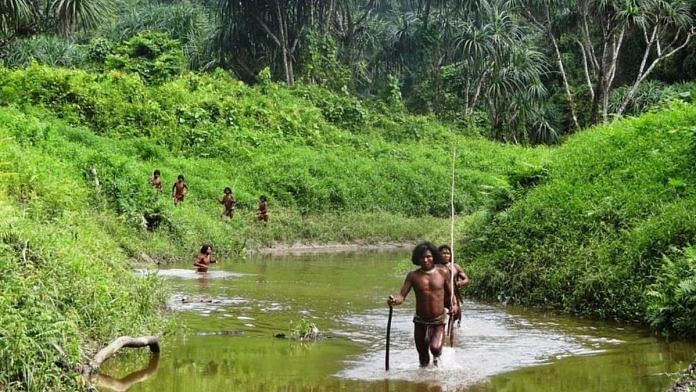New Delhi: The Rs 75,000 crore Great Nicobar Development Project threatens to wipe out the vulnerable Shompen tribe in the Nicobar Islands, according to a report by UK-based Survival International. Released Monday, the report highlighted that the Indian government’s plan to construct a mega-port, airport, defence bases and tourism parks on Great Nicobar Island would expose the approximately 300 surviving members of the Shompen tribe to disease, tourism, harassment and exploitation, while also destroying their forests and means of subsistence. “In my opinion, such major infrastructure projects are not appropriate.
.. The Shompen may be few, but their knowledge of the island’s forests is unparalleled.

Let them remain as they are,” Triloknath Pandit, former director of the Archaeological Survey of India, was quoted as saying in the report. Survival International is a global non-governmental organisation working for the welfare of tribal and marginalised communities across the world. It released the report titled Crushed: How India plans to sacrifice one of the world’s most isolated tribes to create “the new Hong Kong” Monday.
The report was compiled to be presented to the United Nations Committee to End Racial Discrimination (CERD). Citing news reports, expert testimonies, and the Indian government’s own Environmental Impact Assessment (EIA) report on the Great Nicobar Project, Survival International sought to raise awareness and urged the Indian government to immediately abandon all plans for the development. Quoting the 2022 EIA conducted by Indian authorities, the report noted that the government was aware that ‘any disturbance in the natural environment’ of the Shompen tribe would jeopardise their survival.
Currently, there are fewer than 500 residents on Great Nicobar Island. The proposed development project aims to increase this number by nearly 8,000 percent to 6,50,000 permanent residents. Nonetheless, the government has chosen to proceed with the project.
Also Read: Search for an Indian Carl Sagan is on. Science influencers are being trained in labs and likes The Andaman and Nicobar Islands are home to several uncontacted tribes, including the Jarawas, Sentinelese, and the Shompen. These groups have largely remained isolated from the rest of the world, including other Indians, making them especially susceptible to disease through contact with outsiders.
The Shompen tribe, which comprises only about 300 individuals, has been classified by the Indian government as a Particularly Vulnerable Tribal Group (PVTG). They subsist on hunting and gathering and are indigenous to Great Nicobar Island—precisely where a massive development project now threatens their ecosystem, flora and fauna, and may result in the settlement of over 600,000 people from mainland India. “The survival of the Shompen people depends on their isolation from outsiders,” the report quoted Dr Mark Levene, genocide historian, as saying.
“The result of the development project will be psychic collapse and a lingering death.” It is not just environmental degradation and exposure to new diseases that threaten the Shompen tribe. Most members have lived for centuries without external contact, and their ways of life differ significantly from those on the mainland.
By increasing tourist access to Great Nicobar Island, the report warned, the Shompen risk heightened racial discrimination and harassment. “There is also a considerable risk of ‘human safaris’ being conducted among the Shompen, as has happened for years to the Ang (formerly known as Jarawa) people of the neighbouring Andaman Islands,” the report stated. Survival International pointed out that, since the Shompen are uncontacted, there was no effort to obtain their free, prior, and informed consent for the Great Nicobar Project.
Proceeding without their consent, the project violates the UN Declaration on the Rights of Indigenous Peoples, as well as the International Convention on the Elimination of All Forms of Racial Discrimination—both of which India is a signatory to. The report unequivocally called upon the Indian government to halt the Rs 75,000 crore development project on Great Nicobar Island. It also recommended that the territory be designated as a Tribal Reserve and that original rights be restored to the Shompen tribe.
(Edited by Radifah Kabir) Also Read: Posture panic hits researchers. IITs, AIIMS, big hospitals use smart microscopes now var ytflag = 0;var myListener = function() {document.removeEventListener('mousemove', myListener, false);lazyloadmyframes();};document.
addEventListener('mousemove', myListener, false);window.addEventListener('scroll', function() {if (ytflag == 0) {lazyloadmyframes();ytflag = 1;}});function lazyloadmyframes() {var ytv = document.getElementsByClassName("klazyiframe");for (var i = 0; i < ytv.
length; i++) {ytv[i].src = ytv[i].getAttribute('data-src');}} Save my name, email, and website in this browser for the next time I comment.
Δ document.getElementById( "ak_js_1" ).setAttribute( "value", ( new Date() ).
getTime() );.
Environment

Global indigenous rights group says Indian govt’s Great Nicobar project will annihilate Shompen tribe

Survival International's report warns that the Great Nicobar project jeopardises the Shompen tribe's isolation, exposing them to disease, exploitation & environmental destruction.















